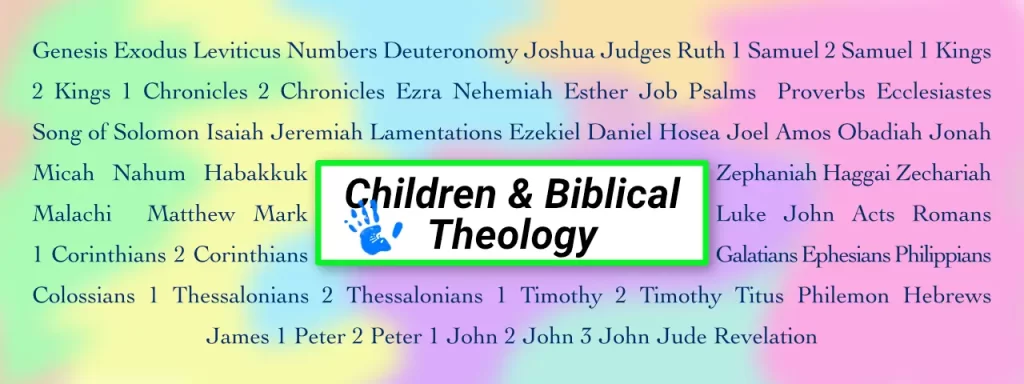Children need to be taught Biblical theology.
What is Biblical theology?
There are three disciplines used to study the Bible. They are exegesis, systematic theology, and Biblical theology. Children need to be taught Biblical theology. I will use the topic of salvation to demonstrate the differences between disciplines.
Exegesis.
Exegesis is to study at the micro level. It is looking at the meaning of words and how they are used. In soteriology, one might study the word salvation and its use. But we need to know how salvation is and how it works, and just knowing what a word means does not answer those questions.
Systematic Theology.
So we then move up to systematic theology, where we take all the passages that deal with the topic and make a coherent understanding of what salvation is all about. Yet we are still missing something. Why is there a need for salvation?
Biblical Theology.
We arrive at the highest level, which is the big picture. We understand the story of the Bible from cover to cover. At the basic level, this is knowing the turning points that leads us along in the Bible’s story. At the next level, one studies the cultural aspect of the period. From my learning, this is how I understand this and feel free to correct or improve upon my definitions.

Biblical theology teaches us that man was created to be the caretaker of His eternal kingdom on earth. The Old Testament is a history of God giving men chances to redeem themselves, but their results are always the same—failure. Man failed, losing the kingdom and his opportunity to dwell with God for eternity.
Salvation is to restore God’s kingdom on earth and restore humans as His caretakers. Salvation is not so God can indulge us for eternity, to be saved from death, or keep us from hell, though the last two are part of it. If we lose the big picture, salvation can be exploited.
Children can learn complex things.
I believe we often underestimate the ability of children to learn. We learn very complex things like language at a very young age. The brain is more capable of understanding the younger it is. Here is a quote from a Boston University study in 2014.
“The current findings demonstrate that, despite its complexity, the basic population-based logic of natural selection is within the reach of elementary school-age children. Young children demonstrated substantial learning of within-species adaptation as a result of a brief but comprehensive, theoretically motivated storybook intervention.”
Children are taught Bible stories and memory verses; however, they are taught without context. Teachers understand that good Bible teaching shows the context of passages, but more important is the context of the Biblical story that is essential. In my opinion, the most important thing a child can learn is the biblical story from Genesis to Revelation. Children need to learn Biblical theology!
Basic Biblical theology.
In my life, I failed to understand the Bible as a complete story. I did know it in a very elementary way. So this is where Biblical theology comes in. It is the ability to see the main points, from plotlines or themes, repeatedly showing the human drama and God’s resolutions.
Without fundamental Biblical theology, substories can be created within the Biblical story that takes students in directions that the real story never intended. See my article about Biblical theology and tongues.
Children can learn Biblical theology. I have been working with my students, and they grasp the story and what to look for as they read the Bible. I feel it is the most critical foundation I can give them. Armed with this knowledge, they can identify when a teacher is leading them in a direction God never intended the teaching to go.
Hopefully, the children will have a context for the verses they learn. Instead of reading about Paul’s suffering and wondering why God wants us to suffer, they will understand it in the context of the Biblical story. Paul was cultivating the earth to bring forth God’s Kingdom. So we must see that as our work, there is a saga to our suffering. We do not suffer to prove we are good people or to earn our favor with God.
Advanced Biblical theology.
Children should build on their Biblical foundation when they become teens. At this point, they need to understand the historical and cultural settings for each scene the Bible turns its lens to.
For instance, some atheists use the following passage to condemn the Bible as an evil book.
“18 If a man have a stubborn and rebellious son, which will not obey the voice of his father, or the voice of his mother, and that, when they have chastened him, will not hearken unto them: 19 Then shall his father and his mother lay hold on him, and bring him out unto the elders of his city, and unto the gate of his place; 20 And they shall say unto the elders of his city, This our son is stubborn and rebellious, he will not obey our voice; he is a glutton, and a drunkard. 21 And all the men of his city shall stone him with stones, that he die: so shalt thou put evil away from among you; and all Israel shall hear, and fear.”
Deuteronomy 21:18–21
Without the cultural context of people in those days, it seems like the Bible condones killing children when laws actually give children a fair trial. Some groups still practice honor killing in which the parents can decide the child’s fate. In America, children who commit certain murders are tried as adults, but they must be tried by a jury.
It would be challenging for a group of people to stone someone’s child if that child was not as bad as the parents claimed. Without this cultural understanding, young people will listen to the critics, and some will turn from trusting the Bible. We see this happening today.
Conclusion.
We must not limit teaching our young people to memory verses and bible stories. They have the capability to understand the point of a story. Therefore they must be taught basic Biblical theology, and as they become teens, they are taught the more advanced aspects of it.

